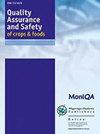基于工业4.0革命的餐厨垃圾集成逆向供应链模型
IF 5.3
3区 农林科学
Q1 FOOD SCIENCE & TECHNOLOGY
引用次数: 5
摘要
本研究通过对餐厨垃圾收集逆向供应链模糊多阶段模型的扩展,对工业4.0革命模型进行了改进,为食品逆向供应链的运营提供了一个有利的模型。本研究介绍了一种象征着工业4.0革命的生活垃圾回收机。此外,根据工业4.0革命,电动汽车已被考虑用于收集和交付。回收站已经描述了技术的速度。根据工业4.0革命指标,选择并评估了几种采用不同技术回收食物垃圾的方法。食物垃圾被送往回收站,即在使用适当的技术回收之前,维护、运营或用于储存、购买或出售垃圾的地方。该替代模型是多目标的,最大限度地提高回收和客户响应的效益,并最大限度地减少环境污染和运输成本的不利影响。在本研究中,应用了whale优化算法。目前的工作提出了一个基于工业4.0革命的食品浪费反向供应链管理的端到端解决方案。本文章由计算机程序翻译,如有差异,请以英文原文为准。
Integrated reverse supply chain model for food waste based on industry 4.0 revolutions
The present research offeres a model to the advantage of operations for the food reverse supply chain by perfor-mancing Industry 4.0 Revolutions model of expanding a fuzzy multi-phase model for the food waste gathering reverse supply chain. This study introduces, a household waste recycling machine, which symbolizes the Industry 4.0 Revolutions. Also, electric-type vehicles have been considered for collection and delivery in accordance with the Industry 4.0 Revolutions. The rate of technology has been described in recycling stations. Several methods with different technologies to recycle food waste have been selected and assessed based on the Industry 4.0 Revolutions indicators. The food wastes are sent to recycling stations, that is places maintained, operated or used to store, buy or sell wastes before they recycled with appropriate technology. The understudy model is multi-objective, maximizing the benefit of recycling and customer response and minimizing the adverse effects of environmental pollution and transportation costs. In this research, the whale optimization algorithm is applied. The present work proposes an end-to-end solution for Reverse Supply Chain Management for food waste based on the Industry 4.0 Revolutions.
求助全文
通过发布文献求助,成功后即可免费获取论文全文。
去求助
来源期刊

Quality Assurance and Safety of Crops & Foods
FOOD SCIENCE & TECHNOLOGY-
CiteScore
4.60
自引率
7.50%
发文量
61
审稿时长
1 months
期刊介绍:
''Quality Assurance and Safety of Crops & Foods'' is an international peer-reviewed journal publishing research and review papers associated with the quality and safety of food and food sources including cereals, grains, oilseeds, fruits, root crops and animal sources. It targets both primary materials and their conversion to human foods. There is a strong focus on the development and application of new analytical tools and their potential for quality assessment, assurance, control and safety. The scope includes issues of risk assessment, traceability, authenticity, food security and socio-economic impacts. Manuscripts presenting novel data and information that are likely to significantly contribute to scientific knowledge in areas of food quality and safety will be considered.
''Quality Assurance and Safety of Crops & Foods'' provides a forum for all those working in the specialist field of food quality and safety to report on the progress and outcomes of their research.
 求助内容:
求助内容: 应助结果提醒方式:
应助结果提醒方式:


